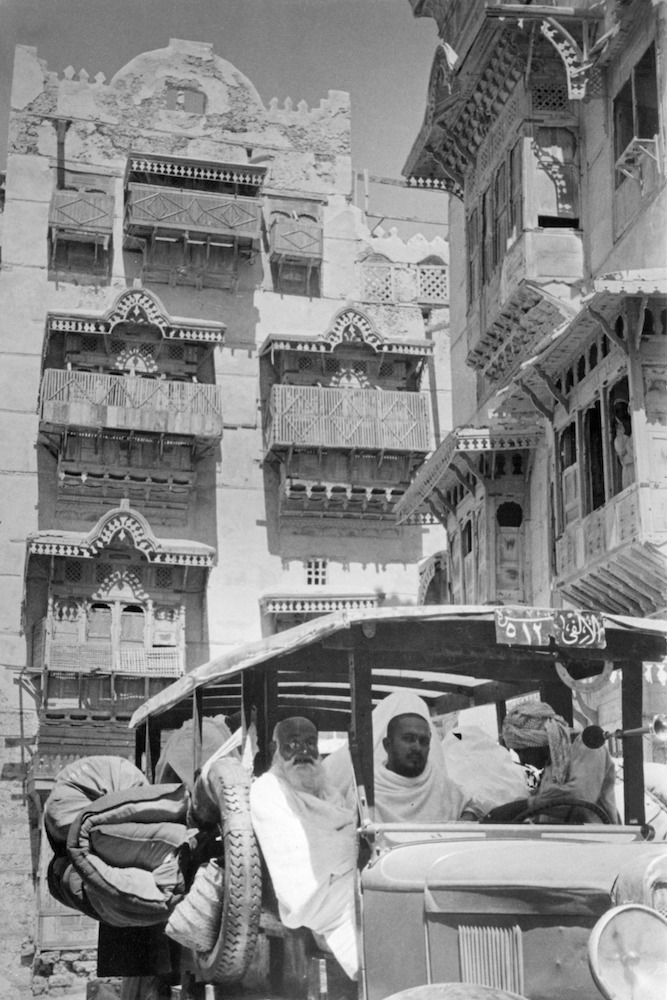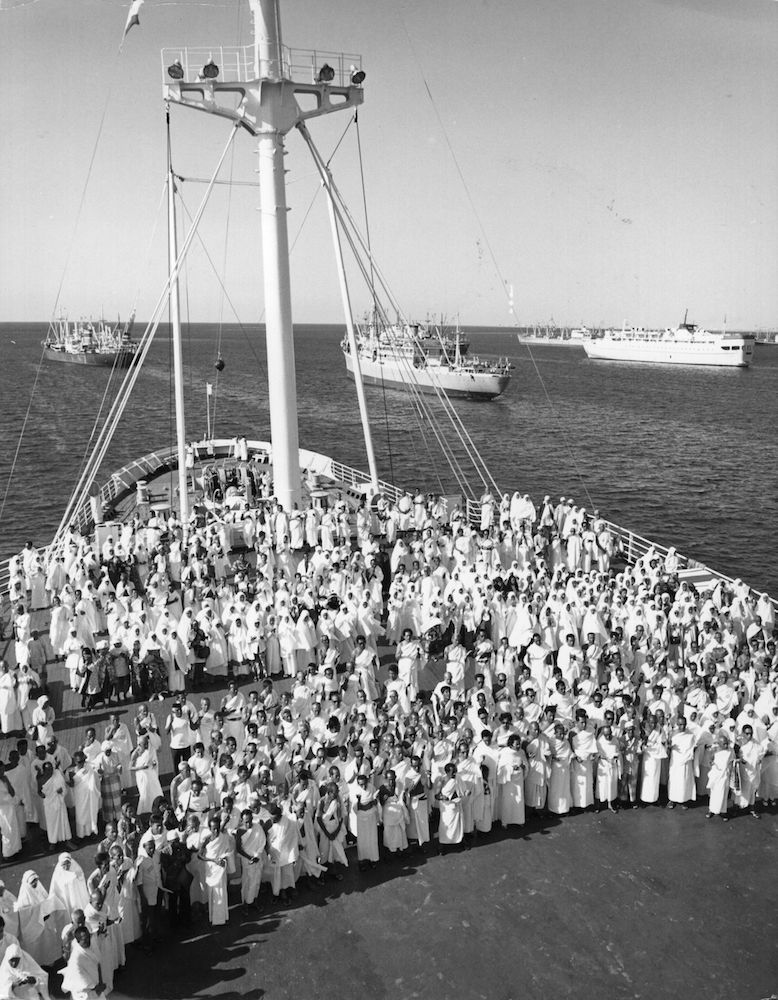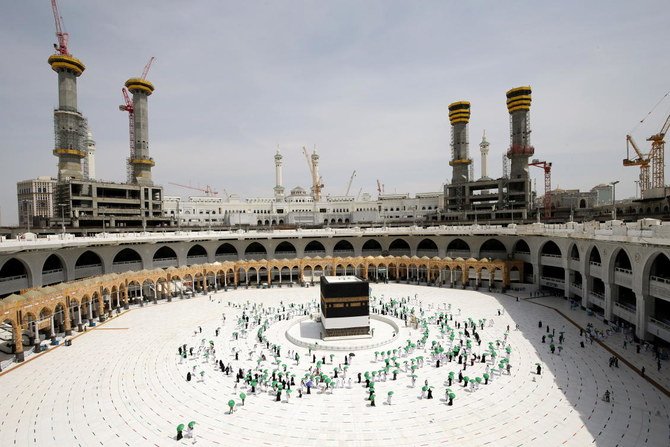JEDDAH: For centuries, Hajj has been a once-in-a-lifetime experience for the millions of Muslims who travel to the Holy City of Makkah. In days gone by the journey was often arduous. But weary pilgrims arriving in Jeddah, for many their first port of call, have always found comfort and friendship thanks to the famed hospitality of the city’s residents.
The port city on the Red Sea coast has been inextricably linked with Hajj and Umrah for more than 1,300 years. In 674, Caliph Uthman ibn Affan, a companion of the Prophet, designated the city as a gateway for pilgrims traveling to Makkah and Madinah.
It has continued to serve this noble purpose ever since, latterly under the careful stewardship of the Kingdom of Saudi Arabia, which works tirelessly to facilitate the movement, accommodation and comfort of pilgrims on their journeys to Makkah, 40 miles to the east of Jeddah, and Madinah, 220 miles to the north.
This gateway to two of the holiest cities in Islam has provided generations of Muslims from all corners of the Earth with food and lodgings on their journey to perform the sacred pilgrimage. But the city offers so much more than shelter and sustenance. Pilgrims have traditionally been greeted with profoundly touching displays of hospitality, solidarity and friendship — a proud tradition among Jeddawis that continues to this day.
Families in Madinah are often referred to as “Muzawareen” — which comes from the Arabic word “zeyara,” meaning “visit” — denoting their inherited duty to take into their homes pilgrims visiting the mosque and the grave of the Prophet.
Families in Makkah are often called “Mutawefeen,” which is derived from “tawaf,” one of the rituals during Hajj and Umrah. Again, this denotes their traditional role in guiding visitors.
By the same token, Jeddawis are often known as “Wukalaa” in recognition of the assistance they provided as agents to the pilgrims who arrived there by sea.

Street view with a car in Jeddah, in 1939. (Photo by Ullstein Bild via Getty Images)
In the old days, large ships carrying the pilgrims would anchor in deeper waters off the Red Sea coast, and the travelers would be brought ashore by locals on smaller wooden sambouks and dhows. There they were greeted by their designated agents, who would show them to their lodgings.
Ahmed Badeeb, a local historian and longtime resident of Jeddah’s historic old city, said that this special bond between the people of the city and visiting pilgrims not only shaped its urban geography but its entire way of life.
“Pilgrims arriving by land were very few,” he told Arab News. “Large ships would bring Hajj pilgrims from all over and there were no hotels in Jeddah.
“The people of the city would provide lodgings for pilgrims in their own homes and the pilgrim would become part of the family, establishing relationships. And when their guests returned home, they’d continue their correspondence because they felt like they had a home (there).
Homeowners would normally sleep in the mabeet, their designated sleeping quarters located on the roof of the house, and provide lodging for pilgrims in the megad (sitting room) on the ground floor.
Pilgrims’ visits for Hajj could last for up to four months, but they usually remained in Jeddah for only a few days while their agents arranged onward travel to Makkah or Madinah. Jeddah was therefore a brief pit stop on their journeys.
HAJJ 2021 IN FOCUS
Pilgrims have arrived at the Grand Mosque in Makkah to perform tawaf in the first Hajj act of the year after reaching the city on Saturday. Keep track of this year's pilgrimage here.
“It would take a few days for pilgrims to prepare their belongings before setting out for Makkah with their food, clothing and supplies,” Badeeb said.
“Camels were rented to carry pilgrims’ belongings, and at times a howdah (a seat on the back of a camel) was also brought in to carry the women. It would take one day to reach Makkah.”
The duration of a pilgrim’s stay in Jeddah varied depending on the arrangements made between the “wakeel” in Jeddah and the “mutawif” in Makkah who would host the pilgrim upon arrival there.
“(Jeddah’s) population would grow exponentially with every Hajj season,” Badeeb added. “It helped with the city’s economic growth and aided the pilgrims as well, as they would sell their goods and spices to residents of the city, who have always been welcoming.”
In addition to boosting the local economy, Hajj also shaped Jeddah’s architecture. Historians believe that because prosperous families in the old city hosted so many pilgrims, it became common for their homes to include several stories — as many as seven. They had numerous rooms set aside for specific purposes and often featured protruding rowshan balconies. The taller and more elaborately decorated the house, the greater the status of its residents.
Inside these towering structures, the owners would prepare rooms for the pilgrims they were hosting. Guests were normally given the megad on the ground floor and provided with mats and pillows.

1976: A crowd of pilgrims from Indonesia on the deck of their chartered ship in Jeddah harbour, bound for Makkah. (Photo by Keystone/Getty Images)
Derived from the word “to sit,” the megad is a large room normally used for welcoming family and close friends. While pilgrims were provided with lodgings on lower floors, families would move into rooms on the upper floors and provide their guests with meals prepared in their kitchen, which was usually located on the first floor.
“By the time the pilgrims arrived in Jeddah, their food supplies would have depleted on their long journeys,” said Badeeb. “Everything was provided for them from the minute they landed until they left.
“Pilgrims arriving from certain countries or regions usually stayed with specific families, facilitated through agents in their home countries. The trust that is built through that allowed them to keep their money and belongings safely stored until they completed their pilgrimage.”
Over the years, as the number of pilgrims steadily grew, it became increasingly difficult to find lodgings with families in the old city. To ensure everyone was safely housed and cared for, the Saudi authorities realized they would have to build new, specialized facilities.
In 1950 the Kingdom’s founder, King Abdul Aziz, ordered a “pilgrims’ city” to be established close to Jeddah Islamic Seaport, where about 70 percent of pilgrims arrived in the country on their way to perform Hajj. By 1971, this city within a city had 27 buildings, including health clinics, shops, mosques and other facilities.
Several similar facilities were subsequently established, including one to the east of the historic old city capable of accommodating 2,000 pilgrims, and another near the old airport, which by the mid-1980s could host 30,000 people.
Times have changed and although Jeddah’s families no longer host visitors in their own homes as their forefathers once did, they continue to offer the same warm greetings and hospitality that has characterized the city’s residents for centuries.


















